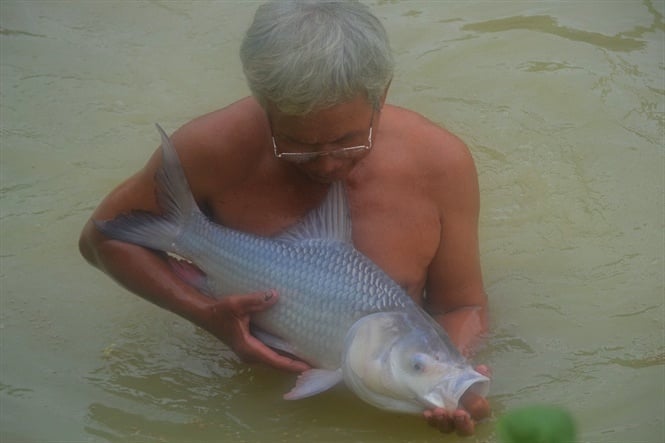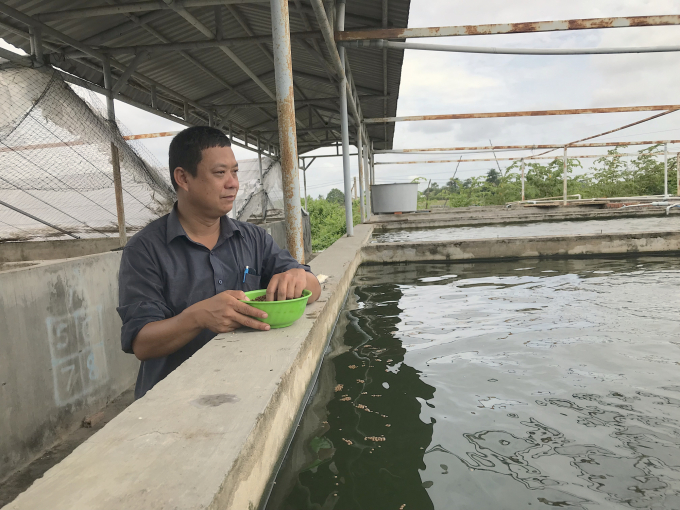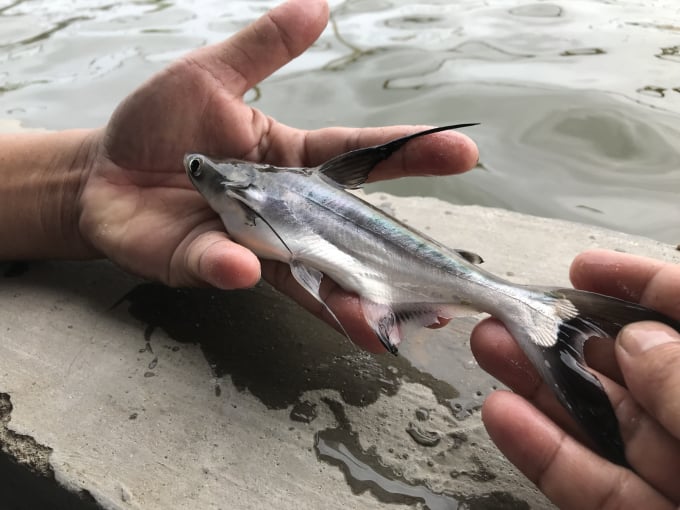June 17, 2025 | 11:05 GMT +7
June 17, 2025 | 11:05 GMT +7
Hotline: 0913.378.918
June 17, 2025 | 11:05 GMT +7
Hotline: 0913.378.918
According to specialized fisheries management agencies, the Mekong Delta is currently home to many fish varieties including: Giant catfish, Pangasius sanitwongsei, Oryzias, Smallscale croaker, etc. These fish species are special, rare, and difficult to find in the wild. Additionally, they are also fish varieties with high economic value, so they are exploited more intensively; many of which are endangered and placed on the prohibited list.

The giant catfish was first successfully artificially reproduced by the National Breeding Center for Southern Freshwater Aquaculture. Photo: Minh Dam.
At the National Breeding Center for Southern Freshwater Aquaculture under the Institute of Aquaculture Research II (An Thai Trung commune, Cai Be district, Tien Giang province), a program has been implemented since the early 2000s to store and preserve the endangered freshwater fish genetic resources.
By 2005, the Center was also the first unit to succeed in the artificial reproduction of giant catfish. The Center was subsequently successful in the artificial reproduction of other fish species including Oryzias, and most recently, Pangasius sanitwongsei. As a result, the Center's success has provided a source of seed for commercial farmers, greatly reducing the pressure on some fish species.
“In addition to the the aforementioned fish varieties, other specialty fish varieties in the Mekong Delta are also preserved such as: Black sharkminnow, sharkminnow, Greater bony lipped barb, Cosmochilus harmandi, smallscale crooker, etc. Various catfish species with high economic value such as: Pangasius krempfi, Pangasius kunyit, etc. are preserved at the Center to be used as materials for research and reproduction of fish species that are in danger of reduction and extinction", shared Master Le Trung Dinh at the National Breeding Center for Southern Freshwater Aquaculture.

Master Le Trung Dinh inspects the pond used for raising Pangasius sanitwongsei. Photo: Minh Dam.
Giant catfish is currently a local specialty fish successfully reproduced in an artificial manner by the Institute for Aquaculture Research II; to serve as supply to farming and trading establishments.
The adaptability of this fish is very extensive, and they can be farmed in almost any location with freshwater sources in the Mekong Delta. Even some northern provinces such as Thai Nguyen can also raise this fish relatively well. In addition, the fish is also farmed in large freshwater lakes such as Tri An, Dau Tieng; and they boast excellent growth in these areas.
“Every year, around 150 to 200 thousand giant catfish fingerlings are commercialized every year. On the other hand, there is a fairly large production of seed sources of different species of fish including Black sharkminnow, Bartail flathead, Pangasius krempfi, and so on", Master Le Trung Dinh said.
According to Master Le Trung Dinh, freshwater specialty fishes are currently growing exceptionally well in the Mekong Delta. Namely, the giant catfish, depending on the size, can reach a commercial price of 200 to 500,000 VND per kg. However, the consumption market is still limited at high-end catering businesses such as restaurants, resorts, etc. People have little demand, so the output for higher-end types of fish is lacking and uncommon including species such as: Shark catfishes, Red tilapia; so the yield and farming area are consequently limited and underdeveloped.

The Pangasius sanitwongsei has been successfully raised by the National Center for Freshwater Aquatic Breeding in the South. Photo: Minh Dam.
Along with giant catfish, Pangasius krempfi and Pangasius kunyit are very delicious specialty fish. Their actual value is also on par with that of giant catfish. They are also a rare breed of fish that are commonly farmed commercially in several caged areas in the Mekong River.
However, the fingerlings supply of these two fish species is still limited because it is more difficult to breed compared to the giant catfish. Mr. Dinh also added that, they are also ordered in large quantities by businesses and farming establishments, but the number of seed output is still relatively low compared to other types of fish.
The National Breeding Center for Southern Freshwater Aquaculture has successfully produced the Pangasius sanitwongsei. Pangasius sanitwongsei is one of the rare, high-value Pangasius breeds. In addition to the commercial fatty fish farming, Pangasius sanitwongsei is also being hunted by aquarium hobbyists with a value of millions of dong owing to its beautiful and unique shape.
Translated by Nguyen Hai Long

(VAN) A cutting-edge farming technique being implemented on an experimental ranch in Arizona's Sonoran Desert has already saved a billion gallons of water over five years, according to Civil Eats.

(VAN) Poultry and pig production and the environment can be boosted through enhanced water technology, according to new research.
![Turning wind and rain into action: [4] Bringing climate bulletins to remote and isolated areas](https://t.ex-cdn.com/nongnghiepmoitruong.vn/608w/files/linhnhp/2025/06/14/1152-z6704423696987_15fd32ffc26d590d204d520c9dac6786-nongnghiep-151141.jpg)
(VAN) The Vietnam Agriculture and Nature Newspaper interviewed Mr. Vu Thai Truong, Acting Head of Climate Change and Environment at UNDP Vietnam, to gain deeper insight into how climate bulletins are delivered to farmers.

(VAN) In Tien Giang, a high-tech shrimp farm has developed a distinctive energy-saving farming model that has yielded promising results.
![Turning wind and rain into action: [3] 300.000 farmers benefit from agro-climatic bulletins](https://t.ex-cdn.com/nongnghiepmoitruong.vn/608w/files/news/2025/06/12/e5a48259d6a262fc3bb3-nongnghiep-125122.jpg)
(VAN) The agro-climatic bulletin has become a valuable tool for farmers in the Mekong Delta. After more than five years of implementation, the initiative is gradually being expanded nationwide.
![Turning wind and rain into action: [2] Providing forecasts to the people](https://t.ex-cdn.com/nongnghiepmoitruong.vn/608w/files/news/2025/06/12/e5a48259d6a262fc3bb3-nongnghiep-103927.jpg)
(VAN) In addition to improving the quality of hydrometeorological forecasts, putting forecast bulletins into practical use is crucial for production and disaster prevention.

(VAN) Blue carbon is receiving attention for its rapid absorption capacity and vast potential. It represents a promising nature-based solution to respond to climate change.